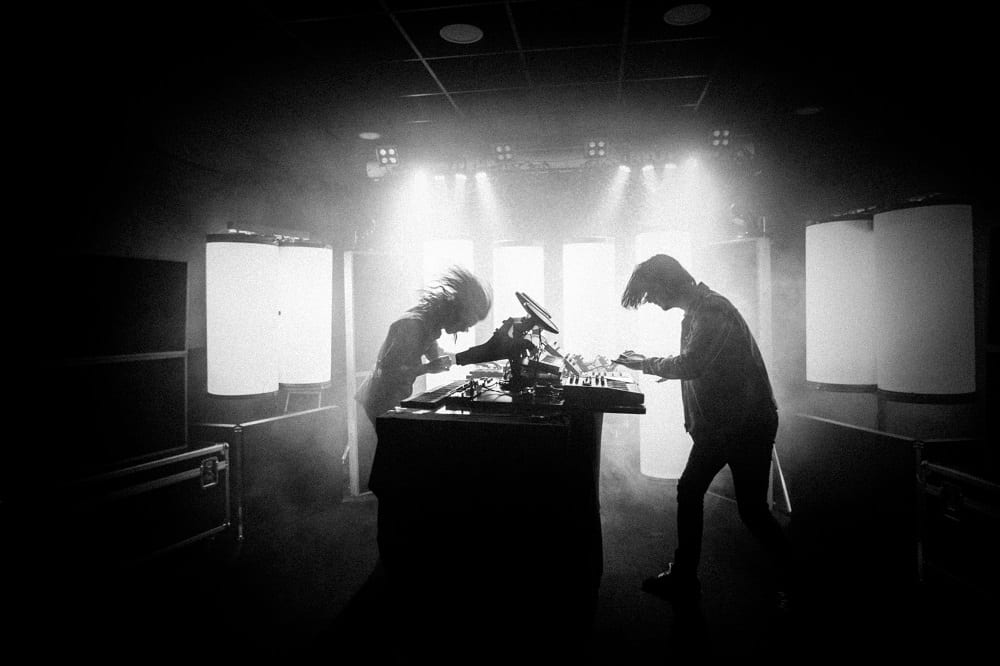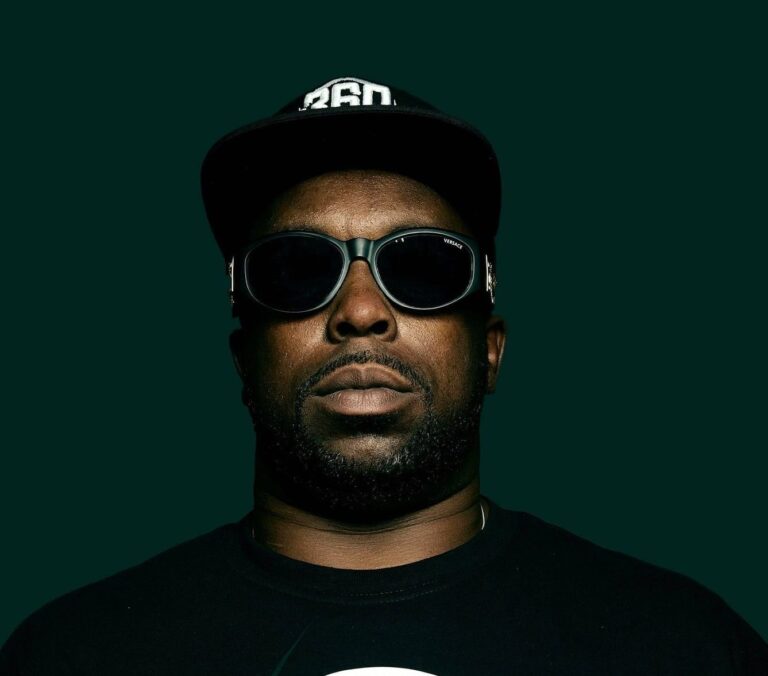More than three years in the making and finally breaking cover. Elodin is the result and the material is playfully categorized as adventure bass.
Luuk Bos, known as Dutch dubstep producer Lifecycle, teamed up with Uri Dijk – a formidable keyboard player from the disbanded Dutch metal band Textures. They combined their different backgrounds to create a new alias.
The duo are in the middle of independently releasing three EPs: Their first EP – Self – already amassed 25K plays on Spotify in a month. The second EP Study hit the digital shelves last week. More is set to come.
Letting go of the familiar, as well as conventional guidance associated with a label release, hasn’t exactly been a walk in the park. Yet this decision seems more than right. Elodin offers a refreshing take on redefining boundaries within electronic bass genres. And this is only the beginning. These EPs – or ‘themes’ as the duo refers to them – serve as groundwork for their first album. What’s more: work on the second album has already started.
So what’s the driving force behind their new calling? And how far are they willing to push it? Read on below for a passionately served dose of insight.
The first EP arrived and was picked up pretty well in terms of streams. How does it feel?
Uri: “We didn’t really expect it, since only people know us from our past projects and we haven’t released anything in three years.”
Luuk: “More than 25k plays on Spotify at this point. Probably the algorithm picked it up, because it did so well in the first weekend. We dedicated a whole weekend to it, spraying it everywhere – like sharing it on WhatsApp, and calling people and asking them to share. It was all done manually, but it worked. At the end of that week the EP was added to the release radar and plays really started stacking up. We can be really proud of these numbers.”
Your bio refers to ‘adventure bass’ as your genre…
Luuk: “We didn’t want to keep doing the same. When you have a track that’s about 170BPM, it’s very easy to make it into drum ‘n bass or to make 150BPM into dubstep. But we tried to steer away from that. All of the songs have those elements, even some metal too, but to specifically call it ‘this or that’ genre never felt right.”
“At some point, someone challenged us to describe the genre and we were like: ‘It’s not really one genre to be honest’. It got me thinking. We need to have a certain position to have an original take, because genres are relevant. Not necessarily for parties, but as a way to explain music. Then it became a challenge to have one or two words describe everything we made so far. It was really difficult.”
Uri: “A lot of our friends listened to our tracks. We always let them listen to our EPs as a whole. That’s the way they’re meant; experienced as one big song. After ten to twelve minutes of listening, people tend to say: ‘wow, what an adventure!’”
Given your different backgrounds; metal and bass music do have some commonalities, but how did you guys meet?
Luuk: “Through a youth center Fascinus – a hangout spot with a skatepark. We just skated and knew about each other, but there wasn’t any of the magic going on yet. I really started when a friend asked us to work on an audiovisual project called Terra with some friends. It’s called A Moment Of by Koyn. We made seven or eight songs. Uri wrote the main theme and we all started working on different songs based on that main theme. Kees (Koyn) started working on the visuals for all that stuff and rendered it. This was his thesis. He’s done a lot (designing) for Viper Recordings. After that I asked Uri to become my piano teacher. He did that for three or four months, but it quickly turned into a collaborative thing. We soon both realized that there was a lot more to it.”
When exactly did the spark turn into a fire?
Uri: “Some years ago my ex-girlfriend went to study in Japan. Luuk was temporarily looking for a new home. I knew my band was quitting at some point and noticed that Luuk’s audience wasn’t ready yet for what he was doing. We both are very strong in that what the other is lacking.”
Luuk: “It fits like a glove. When we first started to live together for about half a year, everything we did amazed us in terms of what we could create together. I knew Uri’s band was quitting. I either just did Rampage or was about to. It was the crown jewel on Lifecycle and felt like a good time to quit at that point. It wasn’t like it bled to death, but it was done. I was trying to make more interesting music. I wanted to have a big audiences and I wanted to do the big venues, but also wanted to implement the weird techy stuff. I realized I had to grow towards integrating that and knew I could do this together with Uri.”
Uri: “When he came to live here for the first months, we had these big plans to make music together, but it didn’t’ really work out. Then we figured we should change the scenery. It resulted in our first real studio session. We borrowed our friend’s car and all the instruments from friends – guitars, basses; anything we could fit into that car – and went to an Airbnb. It was a farm that had a piano, in the north of The Netherlands. We took enough mind-altering substances with us to get inspiration and just started writing and recording for a week.”
Luuk: “When you’re home, you notice you still got to do the dishes and so on. I find it really hard to get away from that. When you’re at a remote vacation house, there’s nothing else to do, other than writing music. After seven days you think only half a day passed.”
Uri: “We visited an abandoned church, an abandoned school, a post office, a farm.”
Luuk: “The church was probably the most epic one. It was full-sized, completely empty. The organ was still there. A shame we couldn’t get it to work, that would’ve been fucking sick. We were taking acid, enabling us to break down any mental barriers. It’s a lot of freedom when you get a church for yourself.”

What’s proven to be the biggest challenge during your journey as Elodin?
Uri: “To get something done, because of our different backgrounds. Also we’re both really stubborn and have an opinion on everything.”
Luuk: “I also feel like one of our biggest challenges is respecting different responsibilities on certain parts of a song while being able to write independently. We gather together in a room and then figure out a timescale to get things done, so that we can create new stuff. We’ve worked on releasing this album for a very long time, partially due to not knowing how to do that.”
Uri: “When we started out we didn’t have a release date yet, but we’re actually almost 50 percent done with our second album already. When we put that pin on the calendar as a deadline, then everything changed. We had to learn all these new things we knew something about, but not enough. We had to do a lot of homework on subjects we didn’t really enjoy initially.”
Luuk: “It’s about finding a timescale and pushing our goals while guarding the process. We’re both butterflies on a summer wind – we just do what we like and keep creating. When we are managing ourselves, that’s pretty difficult. The first time we did that, it felt really good to finally dedicate ourselves to a schedule and release the music.”
So what was the most rewarding part?
Luuk: “Reactions of people, definitely.”
Uri: “Not only in terms of music. Sometimes we argue about that we spend too much time trying to do everything creatively. But we hear people say that it really makes sense what we’re doing. They say that they can really see we thought about it. We didn’t forget about anything.”
Luuk: “There’s a visual style for everything. We worked on it a long time in order to get a uniform design. We try to incorporate that in every post we do and the posters we make. Initially we made these posters to hang up at stores, but the stores haven’t really opened. These posters will be kept in the back-office to give away at shows, or to sell as merchandise.”
Uri: “It’s also very rewarding, because this whole idea of Elodin came to life due to us wanting to do something fresh. We noticed that the first two songs we made during our first studio session sounded like two separate projects combined. Instead of saying: this part is Luuk and this part is Uri, we needed to further blend it together into something new. When the first EP arrived, people actually noticed this and said we’re trying to do something new instead of conforming.”
“To get back to the question: The thing I am quite proud of is that almost every melody or anything you hear is the first take. I press record, play and that’s it. It keeps things extra adventurous. I used to spend days on four bars of melody to make it perfect and I tried to let that go and be able to capture the feeling in the moment. It’s hard in that sense, because now I make too much (laughs).”
Well, it’s the thing with working on the same thing for a while. You get tunnel vision.
Luuk: “That’s where I come in. When a song is almost finished and the last ten percent is not getting there, I just hack a part out, erase 90 percent, and start over because it feels the right thing to do. Instead of treating what you already have as a song, you’re just treating that as inspiration for a new one. It gives a whole different perspective, enabling you to remove the entire beat to see what’s going on when you go double-time or halftime or whatever. It opens up new possibilities by deleting what is slowing you down or preventing creative decisions.”
Uri: “Sometimes I make something and have a specific vision. If I would be pursuing that, we wouldn’t be making music together. Luuk always really surprises me with what he creates. It’s never what I expect, but most of the time it works way better. I think his background as a DJ helps.”
But sometimes you simply do not agree on something. What then?
Uri: “Whenever Luuk has a radical new idea I seldom agree instantly, but he knows I need a few days to adjust.”
Luuk: “I just drop the seed, remove myself from the situation and come back. It’s never just that specific take. Then I say: ‘I’ve been thinking about that radical idea I had and it might work if we do it like this.’ And then Uri has a new angle on it while I do too, so we go from there.”
You produce a unique sound, partially due to experimenting with your own samples. Can you walk us through the different songs on the second EP and provide some background on that?
Luuk: “All the EPs have one track serving as a conception for the others. Once we had those three tracks, we decided to do three EP’s and later on turn an album. We first needed more side-content, that’s why we started writing a few themes. We took the themes and chord progressions, basically taking the key of the song, and created other songs that could follow-up or be an introduction to singles we’d already made.”
Uri: “I remember going to a Nils Frahm concert three years ago. The day after I was playing piano and wrote the entire intro for ‘Study’. I sent it to Luuk, and we went from there – trying to figure out how not to turn it into a piano song, but to incorporate electronics into it. So we did this trick with the bass.”
Luuk: “It’s this technique where you use two notes, like a clean sounding synth, and you play them together. Afterwards you distort them, routing them to a distortion bus together, it results in something that feels like a one note, but there are actually two. It was inspired by Fox Stevenson. The whole bass progression in ‘Study’ is actually made of different chords played by a bass, but distorted. The harmonics resonate together and get amplified by the distortion. This is why the notes sound so rich.”
Uri: “These were the first notes we put in during the first fifteen minutes. It was the first distortion we used and it instantly worked. There are also a lot of sounds we recorded ourselves. I recorded a sample pack a few years ago in my workshop, being used to record everything myself. Luuk has huge amounts of sample banks, so we combined it. We went from there and used themes. The theme of the main drop in ‘Study’ is actually the theme ‘Thunder clouds are white from above’ is based on.”
Can you tell more about the idea for the album?
Luuk: “Our first idea was to release these three EPs as one album. But then we thought: ‘Shouldn’t we do a little more?’ When you tune into an album, you want to hear more than a sum of what’s already released. We’re still in the middle of that process.”
“I could perhaps do a remix without Uri peeping eyes on what I’m doing – creating my own take on a song and adding it on the second side of the album. Uri could do a piano take on a bassline song. We’d also like to ask some friends to do remixes. In any case, we’d like to do an original take on the album. Not just remixes, but something unique. We got few ideas on that now, but those are hyper-classified!”
Certain goals and plans for the months and years ahead you guys would like to share?
Uri: “What I really like and we talk about often: working on a concept for each EP. The next series of EP’s is going to be quite different and adventurous. Imagine creating an EP with only street musicians or only acoustic instruments.”
Luuk: “Or by recording something without any gear and having a mini tape-recorder to take outside and record a few instruments that only run on a battery. Afterwards, instantly putting it on the internet with no processing, to see if we can change the process in a way that changes the outcome.”
Uri: “The main goal is to try to find the boundaries of what we can do. If we would make similar EP’s, we would both get bored easily. There’s still so much we want to do.”
What would you like to add to conclude the interview?
Luuk: “A shoutout to everybody who listened so far and a shoutout to UKF for giving us this chance!”
Uri: “Expect a lot more from us. We are working on a tons of music and new stuff. We have hours of music waiting to be heard.”
Follow Elodin: Soundcloud / Facebook / Instagram

